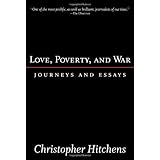
Average Reviews:

(More customer reviews)Christopher Hitchens is one of those writers whose prodigious output of letters, essays, and commentaries on the life, the universe, and everything is so pointed and provocative that he is capable of irritating anyone, sometimes repeatedly so, familiar enough with his work to have read more than just one of his essays. This should not be construed as a negative. In fact, if one is going to fall into paroxysms of anger or annoyance when reading an essay at the very least it should be well written, intelligent, and amusing. "Love, Poverty, and War" a collection of essays written by Christopher Hitchens has all three attributes in abundance and will please anyone willing to take the risk that his/her cultural or political icons may be subject to one of Hitchens' literary assaults.
As noted, Hitchens is prolific. The essays in this anthology were originally printed in
The Atlantic, Slate, the Nation, Vanity Fair, the Weekly Standard, and the Times Literary Supplement among other publications. In addition the anthology includes prefaces that Hitchens has written for new editions of classic works of fiction such Saul Bellow's Adventures of Augie March and Aldous Huxley's Brave New World.
It is fair to say that Hitchens does not suffer fools or cultural icons gladly. In short order he takes aim at Winston Churchill, Mother Theresa, Noam Chomsky, Michael Moore, Mel Gibson, and allegedly oppressive no smoking regulations implemented by the Mayor of New York. Given the diversity of political and social views held by these subjects it is hard to accuse Hitchens of toeing a particular ideological line. One may wince, for example, when Hitchens takes on Churchill and then applaud when he eviscerates Chomsky. No matter whether one agrees with the substance of any particular essay it is hard to disagree with the intellect and writing style of the drafter. Hitchens' very success in advancing his point of view may explain the ferocity of the attacks upon him by those who have been subject to his rapier. Very few can best him intellectually (I certainly can't) or match the sheer breadth of the subjects he has no small amount of knowledge of. Of course the immediate reaction then becomes a personal attack on his motives.
I expected the book to be dominated by the political and literary commentary that marks most of his writings for the Atlantic and Salon. What both surprised and delighted me was Hitchens more apolitical essays. His journey on the tattered remains of Route 66 is a brilliant piece of writing. So to is his look at Hollywood's famous Sunset Boulevard.
I was also surprised by the depth of personal feelings and emotions that runs through many of Hitchens essays. This is no more apparent that Hitchens' post 9/11 essays. Hitchen's description of the deep-seated emotions that welled up in him after the attacks on his adopted country, particularly New York City is very moving. He spoke with a feeling for New York that only a true New Yorker can have. (Qualification for true New Yorker status is not limited to place of birth or length of residence. It is based purely on the quality of ones attachment to it.) This is Hitchens without the sarcasm and pointed wit. He speaks from the heart and it is quite moving.
All in all these essays have something to please and annoy just about everyone. Colette once said that the "writer who loses his self-doubt, who gives way as he grows old to a sudden euphoria, to prolixity, should stop writing immediately: the time has come for him to lay aside his pen." Hitchens may be prolific but he is far from prolix. I trust it will be a long time before he lays down his pen.
This book is recommended for anyone that admires good writing and who is not concerned about damaging any particular sacred cows.
Click Here to see more reviews about: Love, Poverty, and War : Journeys and Essays
Click here for more information about Love, Poverty, and War : Journeys and Essays

0 comments:
Post a Comment